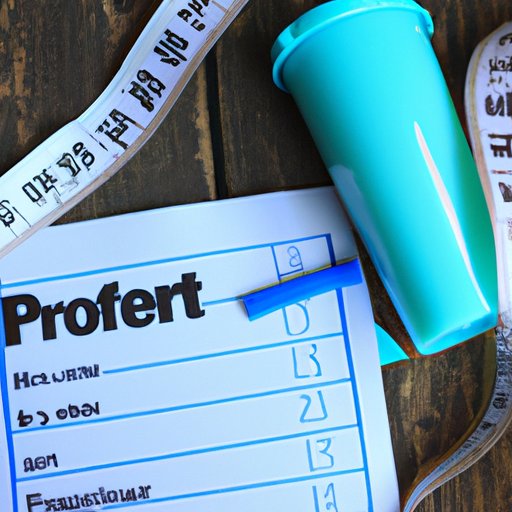
Introduction
Protein is an essential nutrient for muscle growth and repair, making it a staple in many fitness enthusiasts’ diets. But when should you consume this critical nutrient to maximize its effects for workout performance and results? The debate between pre- and post-workout protein consumption has been ongoing for years, with both sides claiming to have the optimal strategy. In this article, we’ll explore the science behind protein consumption timing and provide you with the ultimate guide for optimizing your performance.
Maximizing Your Workout: The Debate Between Pre- and Post-Workout Protein Consumption
There are different theories around protein consumption timing and their effects on workout performance. The primary debate revolves around the so-called “anabolic window,” the crucial post-workout period where the body is in a state of high muscle protein synthesis and nutrient uptake. Some fitness enthusiasts believe that consuming protein during this time maximizes muscle growth and repair, while others argue that the body has a more extended anabolic period, making protein consumption before or after the workout equally effective.
A Comprehensive Analysis of Why Protein Timing Matters in Your Training
Several factors affect protein timing, including the type of workout, body type, and fitness goals. For example, high-intensity interval training (HIIT) workouts require more pre-workout protein consumption to fuel the body’s high energy demands, while low-intensity activities such as yoga or light cardio may require less. Additionally, individuals with different body types and fitness goals may benefit from different protein consumption strategies, which we’ll explore in-depth in the following sections.
Protein Consumption and Muscle Synthesis: Understanding Timing for Optimal Results
Protein plays a critical role in muscle synthesis and growth, with muscle tissue being built by the body using amino acids obtained from protein. Consuming protein at the right time helps the body synthesize new muscle tissue, repair damaged muscle fibers, and reduce muscle protein breakdown. The timing of protein intake, therefore, affects muscle growth and repair, with post-workout protein consumption being ideal for maximum muscle protein synthesis.
The Science Behind Pre- and Post-Workout Protein: How to Fuel Your Body Right
The scientific research behind pre- and post-workout protein consumption provides valuable insights into how it affects the body’s metabolism. Consuming protein before a workout boosts energy levels and enhances muscle protein synthesis during and after the workout. In contrast, consuming protein after a workout increases protein synthesis rates while reducing protein breakdown, maximizing muscle growth and repair. The type and amount of protein consumed play a crucial role in achieving these results, which we’ll explore in more detail below.
The Pros and Cons of Consuming Protein Before or After Your Workouts
Both pre- and post-workout protein consumption have their advantages and disadvantages. Consuming protein before a workout helps increase energy levels, enhance muscle growth, and reduce muscle protein breakdown. However, consuming too much protein before a workout can cause stomach discomfort and slow down digestion, reducing energy levels and affecting workout performance. In contrast, consuming protein after a workout maximizes muscle protein synthesis, reduces protein breakdown, and optimizes recovery. However, consuming protein after a workout may be less effective for individuals with insulin resistance, making pre-workout consumption a more viable option.
Timing is Key: The Importance of When You Eat Protein for Your Exercise Regimen
The timing of protein consumption is critical for effective workout performance and results. Maximizing the anabolic window by consuming protein within thirty minutes to an hour of finishing your workout enhances muscle protein synthesis, reduces protein breakdown, and optimizes recovery. Staying hydrated during and after your workout, consuming high-quality protein sources, such as lean meats, eggs, and dairy, and avoiding processed foods and sugary drinks can further enhance the effectiveness of protein consumption for workout performance.
The Ultimate Guide to Protein Intake: Should You Eat Before or After Your Workout?
Optimizing protein consumption for workout performance depends on several factors, including your body type, fitness goals, and the type of workout you’re doing. In general, individuals looking to build muscle should consume protein after their workout, while those looking to lose weight and improve body fat composition should focus on consuming protein before. The amount of protein consumed also plays a critical role, with protein needs varying depending on your training goals and body weight. A general guideline for healthy adults is to consume 1.2 grams to 1.6 grams of protein per kilogram of body weight daily.
Conclusion
Protein consumption timing is critical for effective workout performance and results, with both pre- and post-workout protein consumption having their advantages and disadvantages. While the timing of protein consumption depends on several factors, including the type of workout, body type, and fitness goals, consuming protein within thirty minutes to an hour of finishing your workout boosts muscle protein synthesis, reduces protein breakdown, and optimizes recovery. By staying hydrated, consuming high-quality protein sources, and avoiding processed foods and sugary drinks, you can optimize protein intake for maximum workout performance.




